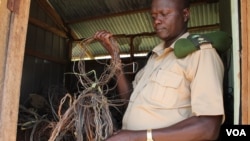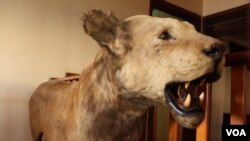A recent report found that Uganda's lion population is down by 30 percent in the past decade. But in the country's Murchison Falls National Park, the figure is closer to 60 percent, mainly because of snares meant to catch bush meat.
On a blistering hot day in Uganda’s Murchison Falls National Park, and Tom Okello, the park’s area manager, rummaged through a shed filled with wires.
“This is a store for recovered poaching implements and equipment,” he said. “So with us here we have the snares. We have wires which are got from electric lines, we have wires which are got from telephone lines, then we have wires which are even got from tires. These snares I would estimate to be about three tons, and these are recoveries in the last five months.”
A snare, Okello explained, is a wire loop tied to a tree or heavy log. Passing animals catch their necks or legs in the loops and are trapped. Snares are set for bush meat, which is illegal, he said. But the big problem with snares is that they catch more than just bush meat.
“These snares are targeting the antelopes, they are targeting the big herbivores like the hippos, like the buffalos, then eventually the lions, because it is also using the same area for hunting,” Okello said. “So where there are snares is where we have the highest concentration of these antelopes, and incidentally we also have the highest concentration of lions. Lions normally get caught in snares which are not targeting them.”
When a lion is caught, it is not pretty.
“If you get when the snare has just got it, probably the state would not be as bad as when you get when it has stayed with this snare for two, three, four days,” said Julius Obwona, a law enforcement warden who leads sweeps of the park looking for snares. “You will find when it is actually in serious pain. There are cases when you find animals that have been amputated by the snares. Sometimes you find them dead.”
According to a report released in October by the Wildlife Conservation Society (WCS), snares in Murchison are catching a lot of lions. The report found the lion population in the park declined 60 percent during the past decade, down to 130 animals, mostly due to snares.
WCS carnivore researcher Tutilo Mudumba said losing lions could have a disastrous effect on the park’s ecosystem, and on conservation efforts in Uganda.
“It would have cascading effects on the conservation of other species which rely on money being brought in,” he said. “But also, if you remove the top predators, then you have populations of the grazers going beyond the carrying capacity of the ecosystem of the savannah.”
The good news is that is has been decades since lions were actively hunted in Uganda. People today are looking for bush meat, Mudumba said, so the solution could be to find other ways for them to feed their families.
“We are following up with those people who are involved in the poaching and suggesting that they be given alternative livelihoods, because they admit that they do it predominantly for protein, not for sale” Mudumba.
The Uganda Wildlife Authority has been working to catch poachers bringing snares into the park, and it appears to be working. Obwona has conducted snare sweeps for years, and the number of snares they are netting has fallen dramatically.
“We would send a patrol, the patrol would come back with over 200 snares in a day. But now when we send a patrol you get like 10, 14 [or] 20,” said Obwona. “Sometimes a patrol comes back with one snare. So I must say the rate is now coming down.”
But Okello said hunting is a longstanding tradition in these parts, and traditions are slow to change. Many people in Uganda love bush meat, he says. The lions, unfortunately, are just collateral damage.
On a blistering hot day in Uganda’s Murchison Falls National Park, and Tom Okello, the park’s area manager, rummaged through a shed filled with wires.
“This is a store for recovered poaching implements and equipment,” he said. “So with us here we have the snares. We have wires which are got from electric lines, we have wires which are got from telephone lines, then we have wires which are even got from tires. These snares I would estimate to be about three tons, and these are recoveries in the last five months.”
A snare, Okello explained, is a wire loop tied to a tree or heavy log. Passing animals catch their necks or legs in the loops and are trapped. Snares are set for bush meat, which is illegal, he said. But the big problem with snares is that they catch more than just bush meat.
“These snares are targeting the antelopes, they are targeting the big herbivores like the hippos, like the buffalos, then eventually the lions, because it is also using the same area for hunting,” Okello said. “So where there are snares is where we have the highest concentration of these antelopes, and incidentally we also have the highest concentration of lions. Lions normally get caught in snares which are not targeting them.”
When a lion is caught, it is not pretty.
“If you get when the snare has just got it, probably the state would not be as bad as when you get when it has stayed with this snare for two, three, four days,” said Julius Obwona, a law enforcement warden who leads sweeps of the park looking for snares. “You will find when it is actually in serious pain. There are cases when you find animals that have been amputated by the snares. Sometimes you find them dead.”
According to a report released in October by the Wildlife Conservation Society (WCS), snares in Murchison are catching a lot of lions. The report found the lion population in the park declined 60 percent during the past decade, down to 130 animals, mostly due to snares.
WCS carnivore researcher Tutilo Mudumba said losing lions could have a disastrous effect on the park’s ecosystem, and on conservation efforts in Uganda.
“It would have cascading effects on the conservation of other species which rely on money being brought in,” he said. “But also, if you remove the top predators, then you have populations of the grazers going beyond the carrying capacity of the ecosystem of the savannah.”
The good news is that is has been decades since lions were actively hunted in Uganda. People today are looking for bush meat, Mudumba said, so the solution could be to find other ways for them to feed their families.
“We are following up with those people who are involved in the poaching and suggesting that they be given alternative livelihoods, because they admit that they do it predominantly for protein, not for sale” Mudumba.
The Uganda Wildlife Authority has been working to catch poachers bringing snares into the park, and it appears to be working. Obwona has conducted snare sweeps for years, and the number of snares they are netting has fallen dramatically.
“We would send a patrol, the patrol would come back with over 200 snares in a day. But now when we send a patrol you get like 10, 14 [or] 20,” said Obwona. “Sometimes a patrol comes back with one snare. So I must say the rate is now coming down.”
But Okello said hunting is a longstanding tradition in these parts, and traditions are slow to change. Many people in Uganda love bush meat, he says. The lions, unfortunately, are just collateral damage.





